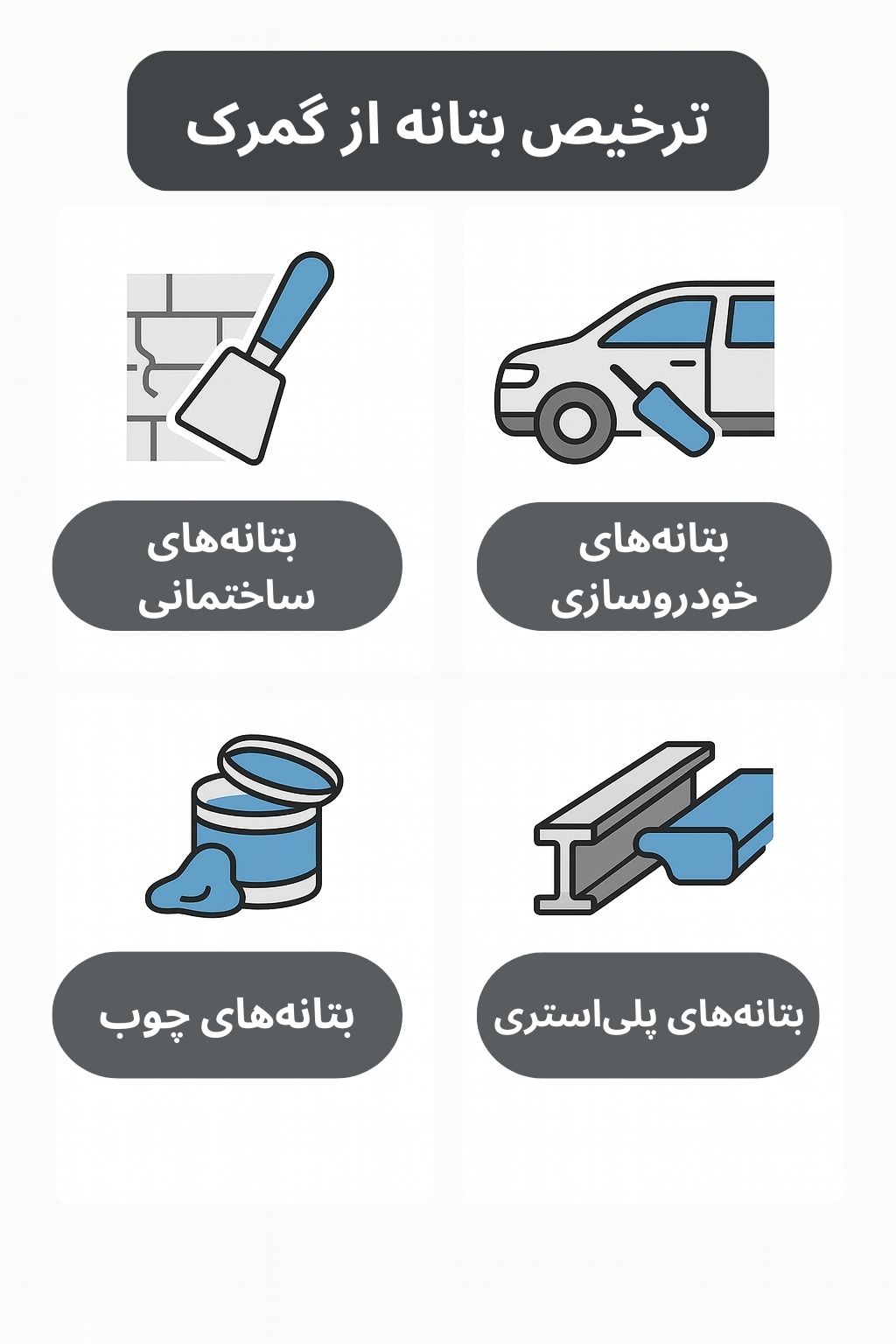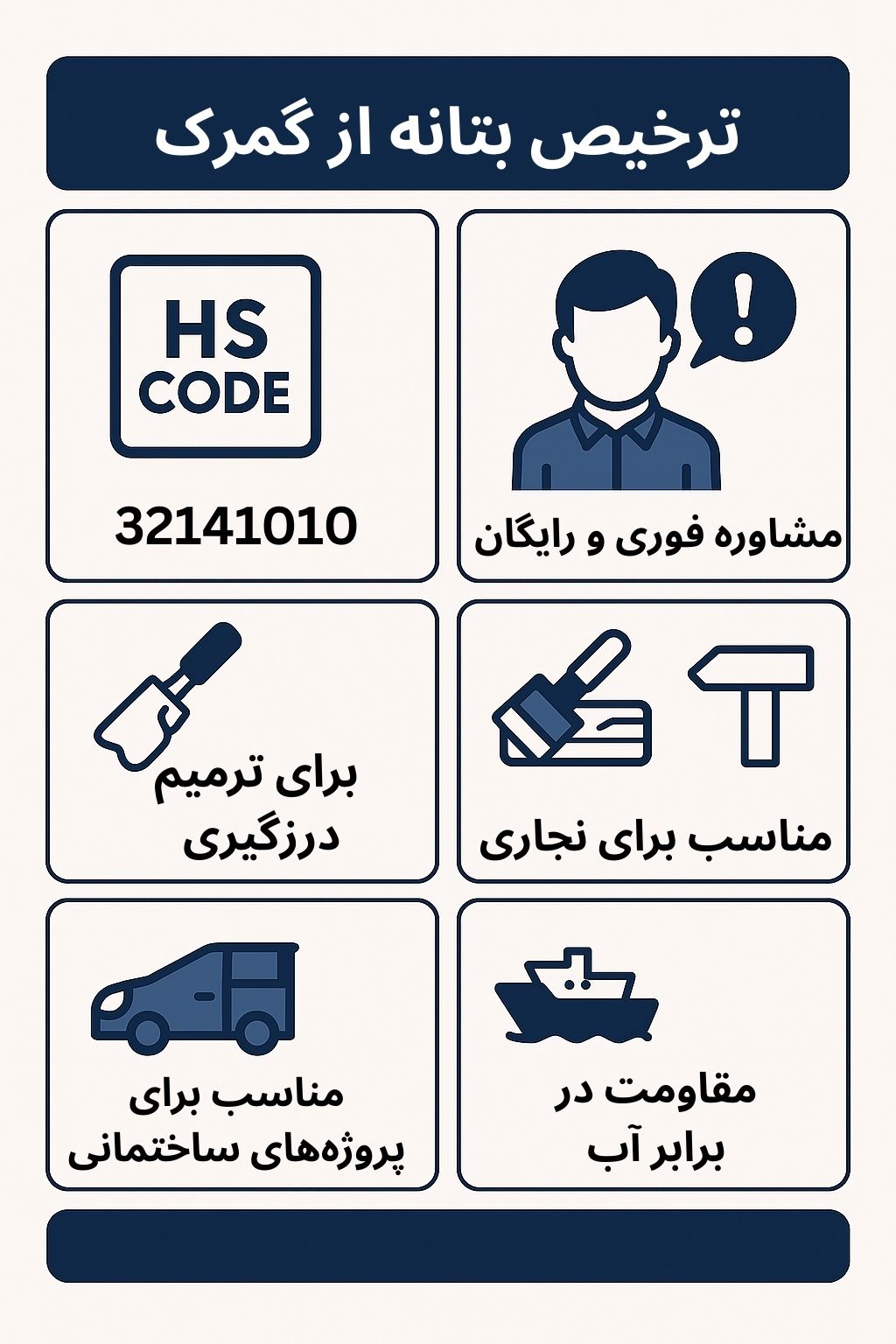Customs Clearance of Various Putties in Iran (HS Code + Documents and Permits)
For estimating the time and cost of putty clearance (construction, automotive, marine, wood, polyester, …) contact the experts at Saba Tarkhis.
Instant Free Consultation
1) Clearance of Putty Types and Their Tariff Codes
1. Construction Putties
Construction putties are used to fill cracks and gaps in walls, ceilings, and floors. These putties are usually made of acrylic or silicone polymers and have good resistance to moisture and weather changes.
Customs tariff code: 32141010
Application: Sealing and repairing cracks in plaster, cement, and other building surfaces.
2. Automotive Putties
These putties are used in the automotive industry for body repair and smoothing after damage. Automotive putties have high adhesion and flexibility, making them suitable for use on vehicle bodies.
Customs tariff code: 32149010
Application: Repairing and filling defects in car bodies and preparing for painting.
3. Wood Putties
Wood putties are used to repair and fill cracks and seams on wooden surfaces. After drying, they can be sanded and applied evenly over the wood surface.
Customs tariff code: 32141090
Application: Repairing and filling defects on wooden surfaces in furniture and wooden doors.
4. Polyester Putties
These putties are used in various industries, including automotive and shipbuilding, to fill metal and plastic surfaces. Polyester putties have high strength and are easily formable.
Customs tariff code: 32141020
Application: Sealing metal and plastic surfaces; suitable for use in vehicles and metal structures.
5. Marine Putties
Marine putties are specifically designed for marine industries and have high resistance to saltwater, moisture, and harsh marine conditions. They are used as sealants and for waterproofing on ships and boats.
Customs tariff code: 32141030
Application: Waterproofing and sealing marine structures, including boats and ships.
6. Industrial Putties
These putties are used in heavy industries to repair and seal metal and concrete structures. Industrial putties must have high resistance to heat and pressure.
Customs tariff code: 32149090
Application: Sealing and repairing industrial structures such as factories and metal equipment.
7. Waterproof Putties
Waterproof putties are designed for environments in contact with moisture and water. They are especially used in bathrooms, pools, and outdoor building areas.
Customs tariff code: 32141040
Application: Sealing and waterproofing in humid environments such as bathrooms, pools, and kitchens.
8. Heat-Resistant Putties
Heat-resistant putties are used in environments dealing with high temperatures. They are applied for sealing and repair in metal and glass industries.
Customs tariff code: 32149030
Application: Sealing and repairing metal and glass surfaces in high-temperature environments.
| Putty Type | Short Application | HS Code |
|---|---|---|
| Construction putty | Wall/ceiling sealing | 32141010 |
| Automotive putty | Bodywork & prep | 32149010 |
| Wood putty | Wood surface repair | 32141090 |
| Polyester putty | Metal/plastic surfaces | 32141020 |
| Marine putty | Sealing marine structures | 32141030 |
| Industrial putty | Industrial structures | 32149090 |
| Waterproof putty | Humid environments | 32141040 |
| Heat-resistant putty | High temp/metal & glass | 32149030 |
Exact subheading depends on formulation, chemical base, grade, and end-use.
2) Key Points in Clearing Putty from Customs
1) Compliance with Standards and Obtaining Legal Permits
2) Performing Specialized Tests for Quality Approval
3) Importance of Packaging and Complete Transport Documents
4) Correct Selection of the Customs Tariff (HS Code)
3) Exporting and Importing Countries for Putty
4) Volume of Putty Imports and Exports to Iran

5) Documents Required for Clearing Putty from Customs
This document is issued at the initial stage of import and includes key information such as product type, price, payment terms, and weight. The proforma is a preliminary agreement between buyer and seller and must be prepared carefully so the information matches the actual shipment at the time of clearance.
The commercial invoice specifies the final product price, details regarding quantity and type, and other financial information. It must exactly match the imported goods. Any mismatch can cause clearance delays.
The packing list accurately shows the number, type, dimensions, and weight of packages. It helps customs inspect shipments and compare them with the declared contents. Accurate information can prevent potential issues.
The bill of lading is one of the most fundamental documents issued by the carrier, specifying transport method, origin and destination, and delivery conditions. It indicates ownership and guarantees delivery to the final destination.
Issued by the exporter’s chamber of commerce, it shows the place of manufacture. This document is necessary for determining customs duties and for reviewing trade agreements between countries.
Clearing certain types of putty requires specific permits from relevant authorities, including:
Iran National Standard Permit: confirms that the imported goods comply with national standards.
Health Permit: mandatory when importing putties used in sensitive environments.
Permit from the Ministry of Industry, Mine and Trade: required for putties with industrial or automotive applications.
This certificate states the chemical composition and physical properties of the product and enables customs to ensure the quality and safety of the putty. It is usually required for putties of industrial importance or with specific applications.
In some cases, importers must provide an inspection certificate from a reputable inspection company. It confirms that the shipment conforms to the specifications stated in the contract and commercial invoice and matches in terms of quality, quantity, and packaging.
The customs declaration contains all product information, including type, quantity, value, and HS Code. It is submitted by the importer or their legal representative and forms the basis for calculating duties and taxes.
Order registration is performed officially via the National Trade Single Window. This document shows that the product is being imported legally and all necessary permits and approvals have been obtained.
The importer must have a valid business card issued by the chamber of commerce. It is an official authorization for international trade transactions, without which imports are not possible.
The cargo insurance policy is an important import document indicating that the goods are insured against potential risks during transportation. It assures the importer that any damages will be compensated.
6) Special Putty Clearance Services by Saba Brokerage
- Specialized consulting: Our expert team, fully aware of customs laws and import/export regulations, advises you on choosing the correct tariff code, obtaining required permits, and all clearance procedures. This specialized consulting helps prevent potential issues and ensures the process proceeds correctly.
- Fast and optimized clearance: Leveraging experienced staff and close collaboration with customs offices and relevant organizations, putty clearance is completed in the shortest possible time. Speed and accuracy are key features of the services provided, allowing you to receive your shipment without concerns about delays.
- Document management: All required documents—from purchase invoices and bills of lading to packing lists and other related documents—are fully and accurately collected and managed to ensure completeness and prevent legal issues at customs.
- Continuous customs follow-up: Our professional team continuously tracks all clearance stages, from goods arrival to completion at customs. This consistent follow-up minimizes potential delays and ensures on-time clearance.
- Securing required permits: All necessary permits for importing and clearing putty—including standard and industrial permits—are promptly and accurately obtained from relevant organizations so the import process continues smoothly.
If you seek fast and reliable clearance for putty imports, our company supports you through all stages with professional and efficient services so your goods are cleared in the shortest possible time and in an optimized manner.
Need precise HS Code classification, permits, and document preparation? Our team manages the end-to-end case.
Submit a Proforma RequestFrequently Asked Questions
What is the HS Code for putty?
Depending on type: construction 32141010, wood 32141090, polyester 32141020, marine 32141030, automotive 32149010, industrial 32149090, waterproof 32141040, heat-resistant 32149030.
What documents are required to clear putty?
Proforma invoice, commercial invoice, packing list, bill of lading, certificate of origin, required permits (standards/health/IMT), certificate of analysis, inspection certificate, customs declaration, order registration, business card, and cargo insurance.
Which countries are the main exporters of putty to Iran?
Germany, China, South Korea, Japan, and also Turkey and the UAE (due to geographic proximity and faster logistics).
Which standards are important for automotive and construction putties?
Iranian national standards, ISO, and environmental/thermal resistance tests; for automotive putties, approvals from the National Standards Organization and the Ministry of Industry, Mine and Trade are also required.
Special Customs Services by Saba Brokerage
Specialized consulting: Our expert team, fully aware of customs laws and import/export regulations, advises you on selecting the correct tariff code, obtaining required permits, and all clearance procedures. This specialized consulting helps you prevent potential issues and proceed correctly.
Fast and optimized clearance: By utilizing experienced staff and close cooperation with customs offices and relevant organizations, putty clearance is carried out in the shortest possible time. Speed and accuracy are hallmarks of our services, so you can receive your shipment without worrying about delays.
Document management: All required documents—from purchase invoices and bills of lading to packing lists and other related paperwork—are comprehensively and accurately collected and managed. This ensures completeness of all information and prevents legal issues at customs.
Continuous customs follow-up: Our professional team continuously follows all clearance stages—from the arrival of goods to completion at customs. This regular follow-up assures you that any potential delay is minimized and clearance is done on time.
Securing required permits: All permits needed for importing and clearing putty—including standard and industrial permits—are promptly and accurately obtained from relevant organizations so the import process continues without issues.
.png)
